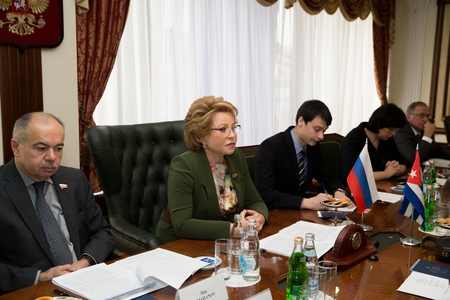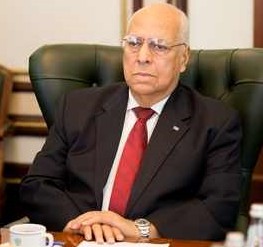
In Moscow, Cabrisas restates Cuba’s conditions for normal ties with U.S.
Full normalization of relations between Cuba and the United States will not happen “until critical issues are resolved,” said Ricardo Cabrisas Ruiz, vice president of the Council of Ministers, in a conversation Thursday (Oct. 22) in Moscow with Valentina Matviyenko, president of the Russian Senate, the Federation Council.
“There is a relationship but there is no normalization,” Cabrisas told Matviyenko, “and normalization will not occur until critical issues are resolved.” What are those issues?

“An end to the blockade, the return of the illegally occupied territory of the [U.S.] military base at Guantanamo, and a halt to the subversive actions that are carried out by groups operating inside the country,” Cabrisas said.
The Cuban official added that President Obama had talked about changes in policy but that Washington’s “goal remains the same: the overthrow of the Cuban revolution. We are aware of this fact, but we accept the challenge.”
“We welcome the beginning of a rapprochement, but the issues have not been resolved. President Obama said that U.S. policy [toward Cuba] failed to succeed for many years, and expressed the need to change it. But then he repeats it again,” Cabrisas said, perhaps alluding to recent U.S. reprisals against European banks that deal with the island nation.
During the recent bilateral talks on renewed relations in Havana and Washington, “Cuba did not surrender any principle that it protects,” Cabrisas told his host. And even if relations are normalized, “Cuba will never depend on the United States in any political or economic terms. Cuba’s policy is very clear and precise in that regard.”
A WEEK FOR BUSINESS

According to the Federation Council’s website, Cabrisas and Matviyenko “exchanged views on a wide range of areas of bilateral trade and economic cooperation, such as oil and gas, transportation, biopharmaceuticals, and health care. [Matviyenko] paid special attention to the cooperation between the two countries in the fight against cancer and diabetes.”
Cabrisas has been in the Russian capital since Sunday (Oct. 18), meeting with various officials to discuss large-scale joint projects in the fields of energy, civil aviation, military medicine, and a program to modernize Cuba’s power plants.
Also on Thursday, Cabrisas and Dmitri Rogozin, co-chairmen of the Russo-Cuban Intergovernmental Committee, signed six bilateral cooperation agreements in energetic, financial, metallurgical and pharmaceutical areas.
The ceremony included the signing of an agreement for the granting to the Cuban government of export capital credit to finance the modernization of the José Martí Iron and Steel plant.
Another agreement provided the granting of a loan to finance the construction of four generating units at the Máximo Gómez and Havana East thermoelectrical stations.
The parties also agreed on a cooperation agreement between the Heber Biotec (Cuba) and Pharmako (Ukraine) companies, as a culmination of negotiations held this week in Moscow by the Cabrisas delegation.
[Photo at top of Valentina Matviyenko, president of the Russian Senate, at meeting with Ricardo Cabrisas. At left is Ilyas Umakhanov, her deputy.]

